It was time to return home after another two-year stint living in the USA. My heart was broken that we could not make our dream of living in Raleigh a reality, and had to move back home to Australia.
This time, we had a three year old with us.
And this time I was ready for IT! There was no way that shady ghost was going to sneak up on me this time.

The time before, in 2006, when Craig and I returned home after a five-year honeymoon, we had no idea IT existed, and it nearly destroyed our lives.
Any traveler – especially those living abroad – will hear tales of the adjustment period called culture shock.
There is nothing like learning it the hard way – back then the spiral took us into a depressive cycle of bad choices that ended in near bankruptcy, the loss of $500,000 in assets, and $30,000 in credit card debt.
This time I had my reverse-culture-shock antidote kit ready to apply.
Disconnection and Isolation
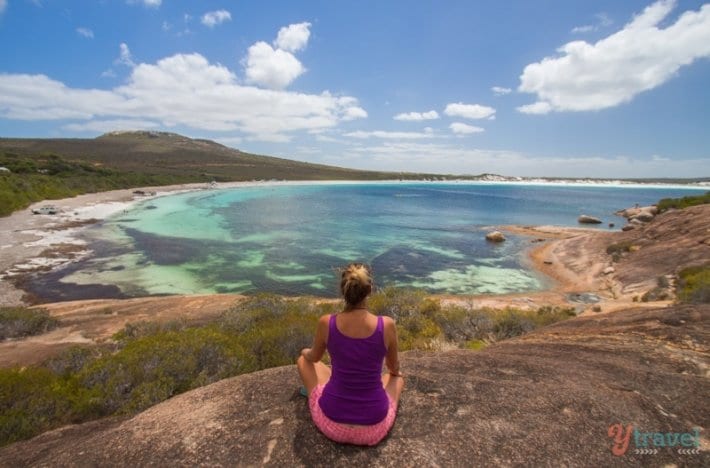
I’ve written this post to help you understand it, and know how to manage it. Since first publishing this post, I’ve had so many people reach out to thank me for helping them understand what they were going through.
They felt so isolated, alone, and slightly crazy. One even told me I had saved them from taking their lives they had been struggling so badly from the disconnection and loss a returned traveler experiences.
I’m sure you’ve experienced after travel blues even after the end of a two week vacation when those higher emotions of love, joy, connectedness, and wonder suddenly end.
Imagine experiencing those emotions daily – for years – as a long term traveling, living in other countries having endless adventures that put you out of your comfort zone, help you grow as a person, and elevate your sense of purpose and joy.
You return home, the faucet turns off, and you no longer recognize yourself, the world you grew up in, and the people you were once close to.
Nobody understands. You feel isolated and shut off.
You can no longer connect to your past – the roots and security that typically makes you feel safe – nor can you connect to the present because nothing feels normal or real – and the future feels like a shirt flapping on the clothesline in gale force winds.
Know this. It does get better.
There are stages you have to move through to process these feelings of loss, grief, and disconnectedness a huge change like this brings.
One thing I know you learned from your travels: humans are amazing at adapting.
Culture Shock
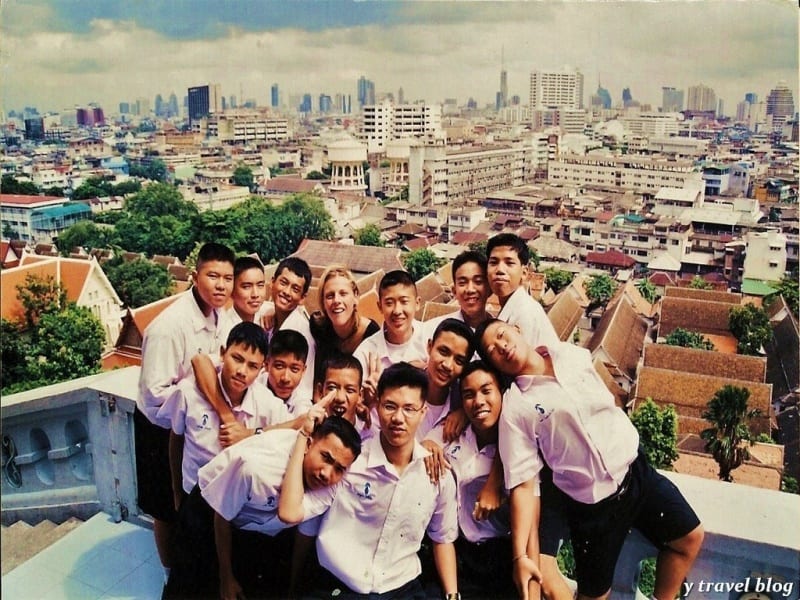
Culture Shock is when you first immerse yourself into a new culture – typically experienced more when you live in a foreign country, as opposed to just traveling through.
Living in another country gives you time to get to know it and discover how you can exist within it. Adaptation is the letting go of what you thought was true and right to accept, understand, and even take on something different.
You move through this weird process of falling in love with the new culture to slowly starting to hate everything about it. That’s the trauma of change.
If you know what it is, you’ll start to accept and understand the very wise adage – it’s not better or worse, it’s just different.
Soon with that acceptance and open-mindedness you move out of culture shock and into a wonderful world of embracing and celebrating the new.
Stick with it because on the other side lies a better you and a more diversely, wonderful world.

I was filled with frustration Teaching in Bangkok at “How they didn’t get it” for many months.
Years later – even though I knew culture shock and thought I wouldn’t experience it again – I found myself sitting in the principal’s office at my new school in North Carolina with tears streaming down my face:
“Why me?” I wailed. “I just don’t understand.”
Culture shock can strike wherever and whenever.
But culture shock on coming home?
Are you kidding me? I know my own culture, what is there to be shocked about?
When I first came home to Australia in 1999 after living abroad for three years, I experienced little reverse culture shock.
I returned home at the same time as many of my friends who had also lived abroad, and I met Craig soon after. One month of celebration moved to another, which safely glided me past the very difficult transition stage.
But then Craig and I went on a five year honeymoon, lived in Bangkok, Dublin, Broome and Raleigh, NC and had the most incredible adventures through South East Asia, Africa, and the USA.
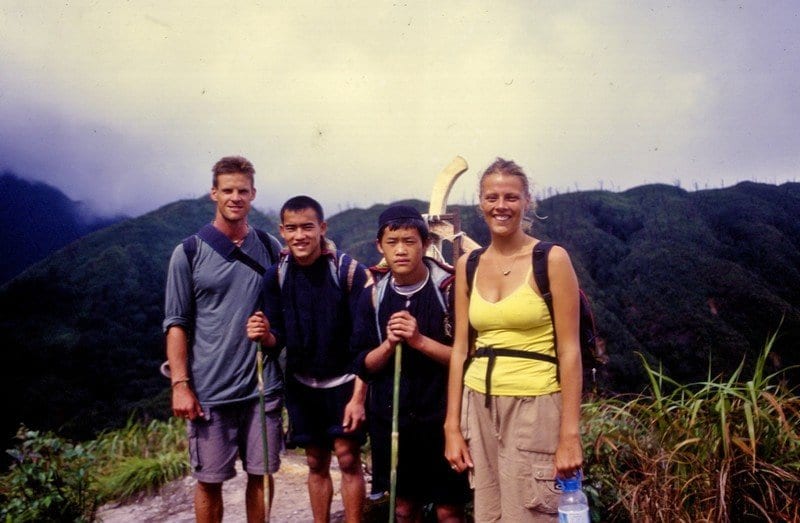
We returned home in 2006, and the proverbial hit the fan.
We went through reverse culture shock, not knowing what it was, instead thinking I was in a state of complete misalignment with the world around me, and completely crazy and alone.
My life fell apart and I kind of let it, through not knowing what to do.
This time we were returning home in 2010 after two years living in the US with our two year old Kalyra.
We were in dire financial straits, which you can hear about in this podcast. But, we had just started this travel blog, so I felt more purposeful.
And this time I arrived home knowing about reverse culture shock and the stages I needed to move through to process this huge change and adapt.
Now I hope I can prepare you, or help you understand just what the hell is happening to you.
The Stages of Reverse Culture Shock
Okay, let’s look at these stages of reverse culture shock in relation to the stages of culture shock. They are the same, it’s just one is experienced in a foreign land, and one is in your home country.
1. Honeymoon Stage

This is the utter excitement and euphoria you feel upon return home. You get to celebrate with your family and friends again,
“Oh and look my favourite Thai restaurant is still open“, and “My God look how beautiful the beach is.”
There’s always Vegemite in your cupboard, the kookaburras sing to you each morning, and you can’t stop saying “Aren’t Australians just so friendly?”
The first stage of being home is a time of reconnecting bliss. How long it lasts it depends on how excited you were in the first place to come home.
If you were dragging your feet, I think you could move out of this stage in a matter of days, or even hours! Typically it will be for a few weeks to a month.
As with all honeymoons, they eventually end, (even if you can stretch them out for 5 years) and end in a big way.
2. Transition period – also known as the emotional wig out stage

Mood swings, foul language, unrest, frustration, anger, depression, alienation – these feelings of helplessness come in undulating waves so bad you feel sea sick.
You scratch desperately at the wall to find some sort of a switch to light up the darkness, but the blackness prevails.
All of a sudden you hate everything about being back home and all you do is complain …
Back in Thailand… Ugh, why do people care so much about this?… I hate this about Australia.. This is so frustrating…God Australia your internet is so F#### crap!! Where’s Trader Joes when you need it? I just wish I could be lying in a hammock having a beer in Laos. How did I go from jungle trekking in Bukkittingi to riding the train to the office in the concrete jungle?
On and on the voices plague you.
You have become an unrecognizable monster deeply set in shock.
Here’s why the shock sets in and the tools you need to have in your reverse-culture-shock antidote kit to help you through.
You are not the same
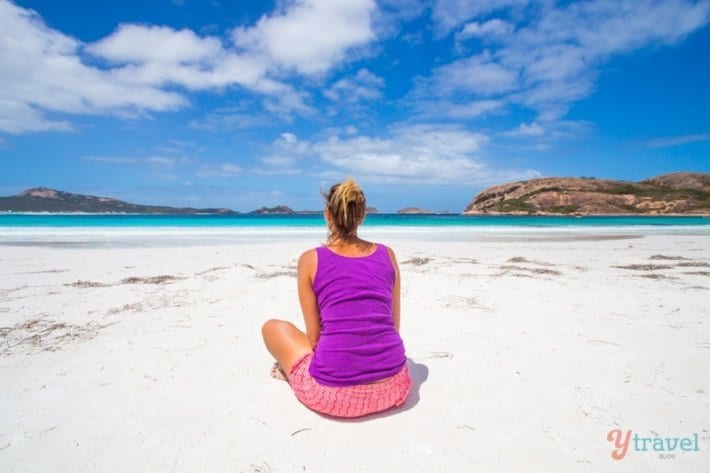
It’s not that everything around you has changed, or that things haven’t even changed slightly, it is just that you have changed dramatically.
You are returning to a place where people expect you to be the same as when you left.
Every day you are faced with confusion and pressure and there is always that feeling of not being accepted for being the new you.
People want you to be who you once were and you CAN’T. So a lot of the time you hide away so you can be the real you in private; the YOU you like to be now.
Antidote:
- Accept that you are not the same. You see things with different eyes and people may not recognize this anymore. It’s okay. Remain true to who you are. And if it means that some friendships change as a result then so be it. Things change, it is the nature of life.
- Spend time with those who accept the new you and start making new friends. We joined the Sydney Travel Massive group, which is full of travelers who understand us. It always feels comfortable and easy to be with them. I still enjoy hanging out with my closest friends, but it’s nice to be a different me with others as well.
No one is seemingly interested
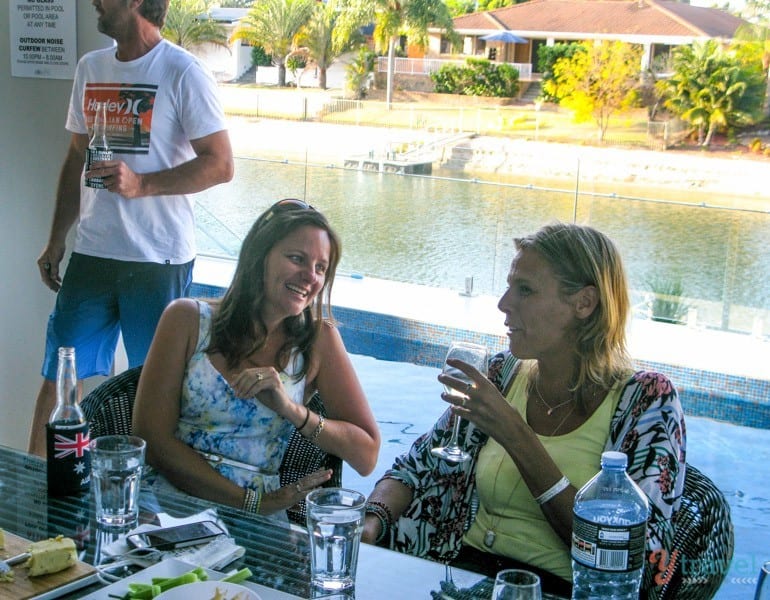
You see the eyes glaze over and the look on peoples’ faces when you begin to talk about your life overseas, until eventually you learn just to shut up and do your best to join in their conversations.
This hurts.
You feel as if they’re not interested in your life and who you are now. They may even feel as if you are big noting your life, and so look upon you with disdain.
But you are not. You are just sharing your life as it has been for the last couple of years.
What else can you say? You can’t make your past go away. And why would you, it was a joyful, meaningful past.
Your memories, your thoughts and beliefs are now connected to the experiences you had on the road. This only leads you to feel more out of place and more frustrated with being home.
Antidote:
- Understand that most of the time those you are conversing with have little understanding or connection with you have done. They may be shutting off because they don’t know what to say or how to relate to you anymore.
- Don’t make all of your conversations about your travels, but don’t completely shut it off either. It is who you are and its important to you. You might even want to let those know that this is important and it hurts you when they don’t act interested.
- Take time to find those who have traveled like you and share your stories with them. They get it and most of the time will delight in roaming down memory lane with you.
- Make sure you spend time with your closest friends laughing and reminiscing about special times with them. You will feel wonderful and it will remind you what is so great about those who you chose to leave behind for long periods of time. It will help them to realize that just because you lef, does not mean you still don’t love and cherish them.
There are some things about your culture you won’t like
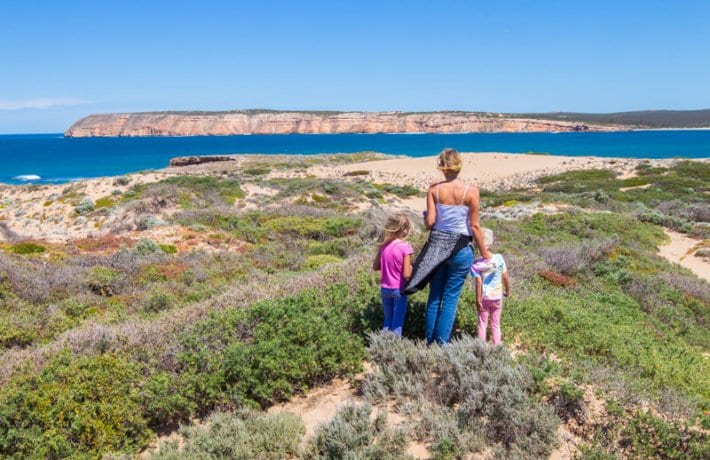
“TRAITOR!!!!” is what your mind screams with every negative thought you feel about your own country.
But you just can’t help it.
On your travels, you may have discovered other ways that you liked better or think worked better.
And then you have to try and explain that to others who can only agree with one thing and this is your mind, as their eyes too shout out “TRAITOR!!!”
Antidote:
- For culture shock, you constantly need to repeat the mantra “Not better or worse, just different.” Do the same with reverse culture shock as well. It is okay to appreciate other ways more, just don’t try to fight the old ways. You can’t change the god damn internet speed, so stop wishing you were back in the land where it is 21st century speed. Go get yourself a cuppa, by the time you return the page should have loaded.
- Try to adapt the old things you don’t like into new. For example, I have been struggling with having to go back to a traditional Christmas, I liked doing my own thing. So I am doing my best to make it more of a joyful occasion by attending the Carols in the Domain and having our own private time as a family during the day.
- Look for those things you love about your country and focus on that. I try to get to the beach as often as I can as I love Australian beaches and it helps me to forget that bloody internet speed.
You are not travelling anymore

You slip back into the mundane where nothing is new and everything is the same.
Wrong Wrong Wrong.
There is plenty of newness in your home town or country, you just have to look at it with new eyes. Many people remain trapped in the idea that their travels are over, almost as if life is itself.
I’ll put my hand up to this one when we returned home in 2006. I felt shut off from life itself. It felt like nothing could ever fulfill me like travel did.
Not only did I not recognize myself anymore in my home country, but I could not envision a life without travel. I was lost and confused and felt so isolated and trapped.
I still feel that almost daily, but I know how to work through it and this travel blog really helps a lot.
Antidote:
- Start travelling in your own area. This was the biggest thing this time that helped me to slay the reverse culture shock beast. Every weekend we jumped on a train down to Sydney to explore, we did the seven bridges walk, hung out at Terrigal Beach, went moon walking, and did adventures on the Gold Coast. This helped me to see the beauty of Australia again and to breathe that travel excitement and anticipation.
- Find a way to put into practice all you have learned from your travels. You may start a travel blog or write a book to share your experiences, or you may even start a new career. Start new hobbies, and meet new people — anything that will bring back that sense of travel for you.
Everyone wants to see you
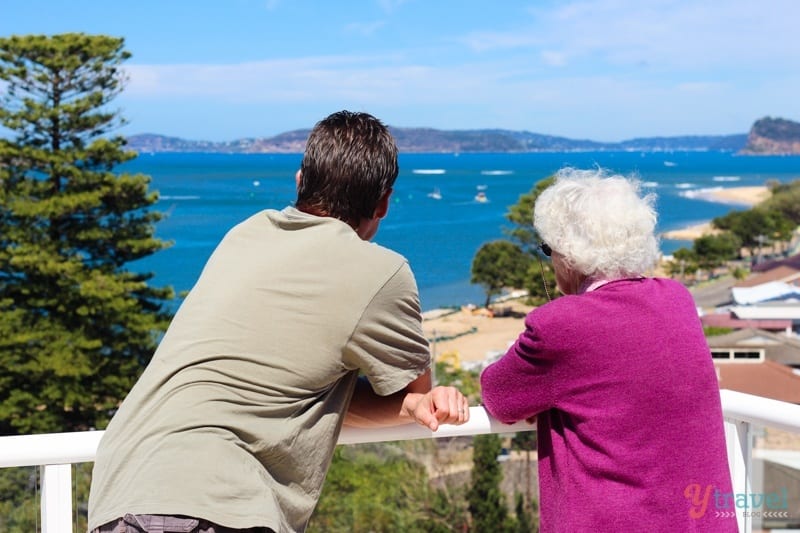
Of course. And it’s great to reconnect with loved ones, but it can be very exhausting, especially because you are not used to it.
Go slow.
You have just returned and everyone wants to see you, and when they do there are the eternal questions about what you are doing next.
Next?
I’m still trying to grasp being in a different time zone, let alone come up with future plans.
You’ve spent the last however many years, either on your own or with your partner, only socializing with other like minded travellers, usually at a time and place that agrees with you.
Suddenly there are people everywhere demanding of your attention. There are birthday parties to attend, christenings, weddings, and catch up dinners.
You feel stretched in all directions, and really you just want to crawl into the nearest hammock and shut the activity out. It is extremely overwhelming.
Antidote:
- Take the meet ups with everyone slowly. We always came home in a mad rush as we we would be on the road again shortly. This time we were in no hurry to see anyone. This was not because we didn’t want to but if we did we knew it would set us back months. So we took it slow and steady. I didn’t see some of my friends for a month until I returned. You don’t need to go to every event. Take a step back and take some time out.
- Organize one event at one destination and tell everyone you know to meet you there. This means you get to see everyone, but you are not running to a million different parties to catch up with a million different people. Make them come to you. Remember they only have one person to catch up with you have hundreds. You have to be selfish here or Reverse Culture Shock will beat you to a pulp.
Does it ever get better?
3. Readjustment Stage
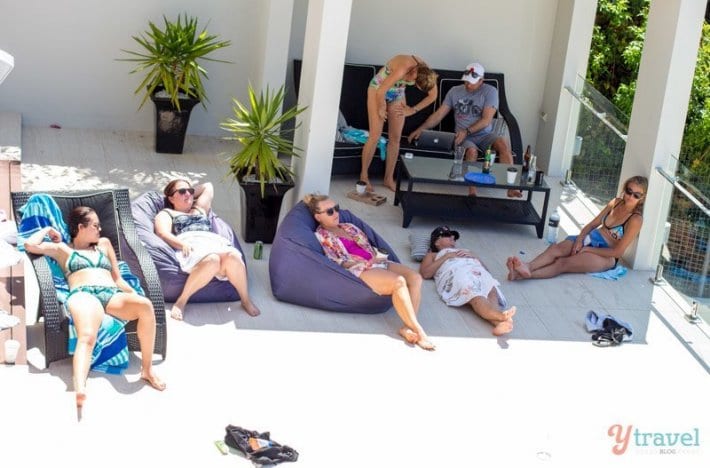
Yes.
After about 6 months of being home, you will have started to readjust. How long it actually takes depends on you and how prepared you are to deal with the onslaught of turbulent emotions that are coming.
Coming home after being away for so long is a massive readjustment, bigger than you will ever realize until you go through it.
Don’t forget the life of your travels, but don’t hold on too tightly to them either; that is holding onto the past, which is never a good thing because life doesn’t exist there.
It’s time to adapt, create a new life path, and put into good use all you learned along your travel journey.
You have to find your place once again. You may discover your place is somewhere else and that is fine. You might discover you are happy to be home and that is fine too.
We talk more about reverse culture shock and how it lead us down a path of financial hell in this podcast.
And I share more about life after travel in these posts:
- Mixed bag of emotions about Life after travel
- You’ve got time + the end of a 22 year nomadic life
- Thoughts on the end of our 18 month Australian road trip
- 8 reasons why travel helps you live a good life
- 43 Travel Tips for First Time Travelers
- 55 Lessons learned from a Life of Travel
- Travel Manifesto – 10 Principles to Create Awesome Travel Every Time
Pin to share:
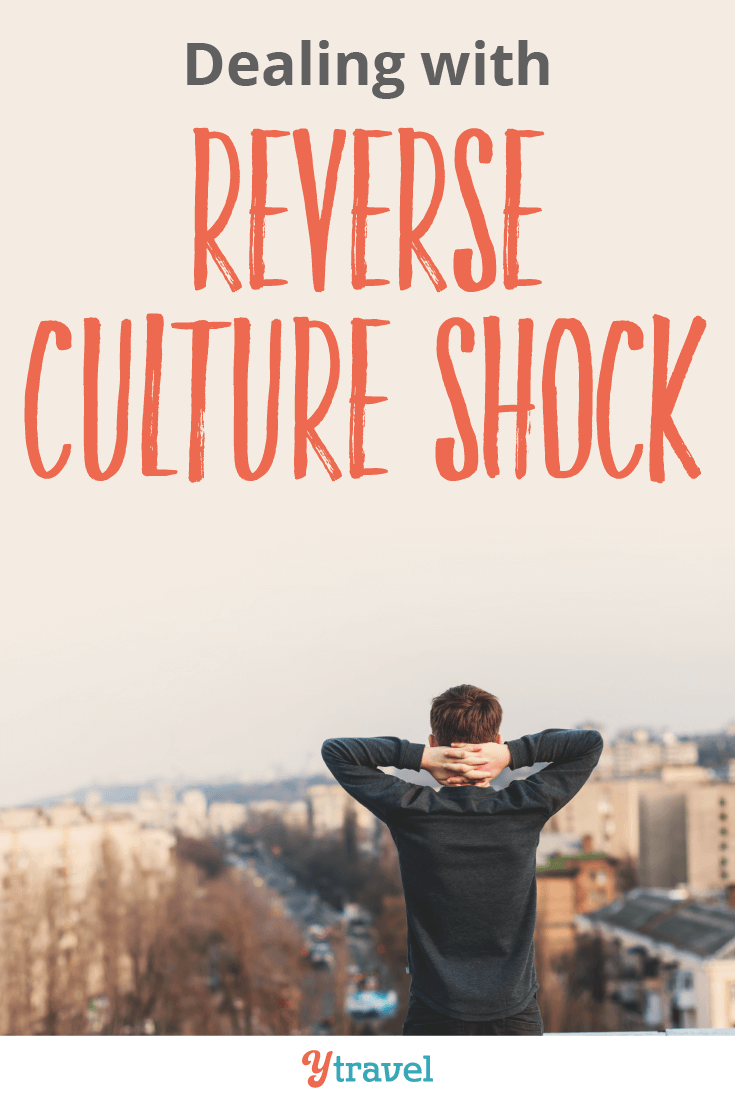
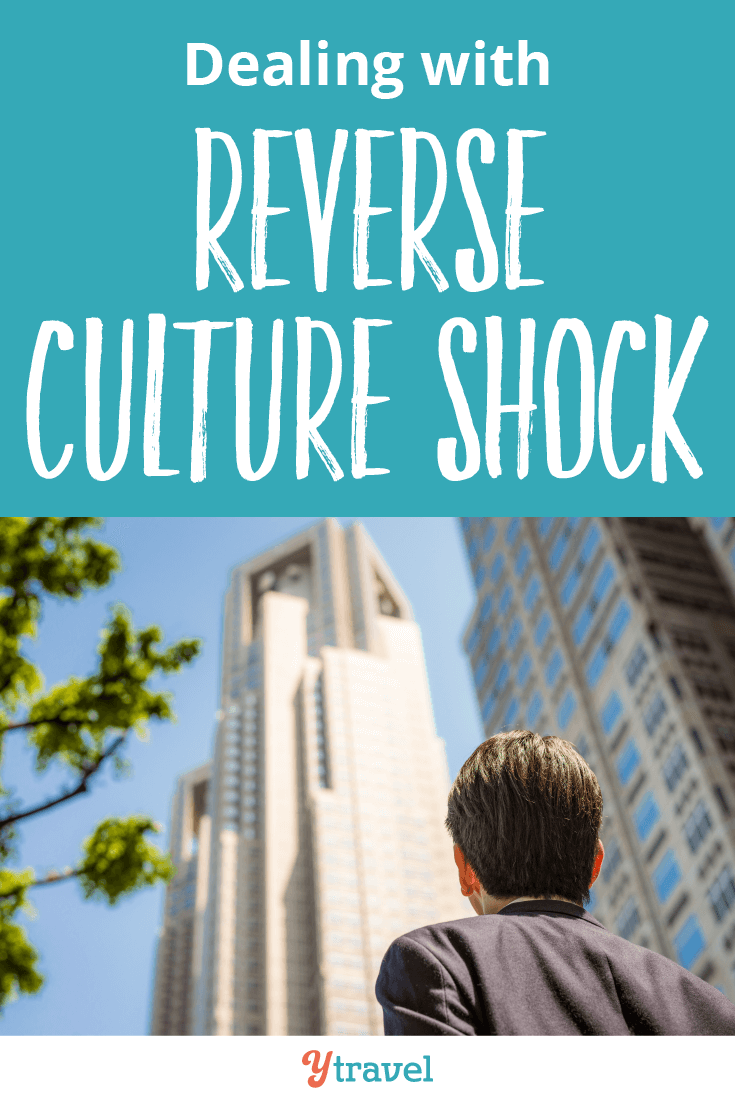
What have been your experiences in Dealing with Reverse Culture Shock?
AMAZING post! so incredibly thorough and great suggestions for mitigating the affects. we’ve definitely experienced this upon returning home. that feeling of getting off the plane, train, etc. and having a nearly audible “wa wa wa wa” sound with our first step. everything’s dirtier, louder, more expensive, uglier than we remembered. people are meaner. we’ve come from paradise- we’re enlightened and no-one gives a hoot 😉 it takes a while to shift the perspective back to a brighter one. think you’ll really help others short-cut that process with this one- love it!
Wow. I have come to expect great posts from you guys, but this one is a real keeper.
I really like your approach here. I like that you have provided “antidotes,” some ways to take positive steps forward. Your not shying away from talking about reality – the honeymoon ends, old friends are jealous bores, the internet in Australia is shit… But you are also not wallowing in it. Hooray for positive action!
This post really speaks to the driving force between our NVR life. We love home (I mean LOVE home) but not for too long. It’s our recharge station. Things are familiar, we have our routines, our computer monitors are ridiculously big… What is especially great is that we always have a journey (or two, or four) in the works. So we can really savor being in our nest. Not to sound like I am gloating (I am a little bit, shame on me) but it really is ideal. At least for us.
By the way, Trader Joe’s is all the reason one needs to live in the states. It can do a lot to gloss over the our version of shitty internet – fundamentalists, xenophobes, the tea party…
Thanks for another excellent post!
This is essential reading for anyone returning home after an extended period of time abroad. I remember the first couple of times I returned to the US after long trips and sadly, I had no idea how to deal with the reverse culture shock. The result was that I became quite angry at everything and everyone and eventually would just take off again to another foreign destination.
Luckily, I’ve learned how to deal with the shock in a more beneficial manner over the years so that now I actually look forward to my visits home. One of the most important pieces of advice, which you provided above, is to continue traveling when you’re at home. It can be as simple as walking around with a camera and looking for interesting photos or doing all those touristy things in your home city that you’ve never done before. And before long, you’re eyes are open wide once again and life becomes as fresh and educational as it is while traveling.
We both know exactly what you’ve felt like when you returned home. Every time we came back home after periods of living abroad we felt exactly the same way, especially about the people around us who, like you say, just expect us to be the same, which we are obviously not. Should we ever move back to Germany (which could happen some time in the far away future…) we have to find this post again to remind ourselves we can get through this 😉
Such a great post, so true, everything you have described I went through when I got home. The worst thing was I didn’t understand why all of my friends weren’t feeling the same since they had just gotten home from time abroad too! I guess their experience was just a part of their life while mine turned into a major aspect of mine.
Suddenly no one understood me and no one had time to listen. I think you have made some great points; turning your home into a place to travel makes you feel like you are still living the life, while giving you time to sort some things out. And hopefully those closest to you can relate to you in a different way that will help you through the shock!
Ten years ago I experienced it and I’m really not looking forward to it again this time. I think a lot of people struggle because they feel alone in the ordeal, but it’s so common. Good on you for writing about it.
It is difficult, especially when you are returning to a western environment after a stint in the developing world – I remember just staring at shop windows,all the shiny, expensive goods…
Caz, this is such a great insight into reverse culture shock: thanks. I really think everyone who’s travelling or planning longterm travel should read it.
It’s interesting that you mention feeling like a traitor for disliking elements of your home country: I guess because I’m a Pom and we whinge a lot and don’t really do patriotism as Australians and (even more so) Americans do.
Like Earl, I whole-heartedly agree with the point you made above, that maintaining the travelling or exploration mindset is a great way to rediscover the joys of your home country and work through culture shock. I think another thing to do is to celebrate (quietly) the fact that you do have open eyes, and a new perspective.
I guess, also, on a personal note, the question is whether you need to commit to staying back home and raising Kalyra at home, given your lives are so portable anyway, and given what you’ve said about raising girls in Oz. Not, probably, a decision to be made on the hop. But maybe one to think about…
This is some priceless advice! It could be broken down into so many pieces! I just linked it to a recent article of mine where I share on this same subject after working for Toyota in Singapore for three years!
Thanks Hilary. I see you are writing a book about your experiences- it sounds fascinating. You went to Elon university? We lived in Raleigh for four years. Absolutely love North Carolina!
Caz, I only just returned from a semester studying abroad at UNC. I can easily say that they were the best four months of my life and I’m really stuggling to cope with London life. I haven’t really left the house in a month because there doesn’t seem to be very much else out there. Is it just me or is Raleigh the happiest place in the world? I lived in Chapel Hill and I dream of going back everyday.
Oh I think it is Queenie. WE miss it so so much. We are totally jealous that you studied at UNC and lived in Chapel Hill. We’d move back in a second if the opportunity arose. It’s so funny because I was nervous moving there in the first place. I thought it was the back of nowhere and I’d hate it but I loved it so much. There is something about the energy there- good good times. I hope it gets easier for you in London. It does with time. Can you go back to Chapel Hill at all?
I am so glad that you can empathise with my scenario! Such a relief. I was exactly the same when I was flying down, I didn’t have the foggiest about what it would actually be like. All I was expecting was greenery and a small town atmosphere…but I was totally wrong. Anxiety turned into curiosity and absolute adoration for the town, the people, the food, almost everything. A lot of my experience was credit to the friends that I made along the way that were also International students and we would travel to other states on the weekend yet I was always keen to get home…to Chapel Hill. NYC, California…nothing could compare. In fact, I recently read an article on Bloomberg buisiness week that places Raleigh the best city in America to live in! How scary is that!? Yet true. It instantly made me want to live there again…i am seriously considering moving there once I complete my final year in London. Only thing is, I’ve been advised that the study abroad experience that I had will not come back and can not be created as the same people wont be there, yet i somehow feel like its the place where i felt happiest and so I should simply return and make new friends and start my life there…maybe join Teach America or find work elsewhere? I simply LOVE North Carolina – it is my paradise and my haven.
Wow I didn’t know that about Bloomberg putting Raleigh as the best in the States. I know it has always listed pretty high. And Oprah once had it as the best place for singles. I think if it’s calling you and you know that it is your one place in the world then go back. You will make new friends again. We were there two years and came home for two years and then had to go back for another two. Now our visa options are dried up and we are praying for a green card miracle.
Thanks guys, exactly what I need to read at the moment. I haven’t even been home for 48 hours, but I was anticipating I’d meet these feelings quickly, and I have. Need to remind myself I’m definitely not alone in this 🙂
You are sure not alone! good luck with the transition and I hope you adjust quickly. It is taking us some time,but we really don’t like where we are living. If we could move to another place in australia we might feel better.
I am in the emotional wig out stage! Random tears all the time, I can’t stop them they just fall and no one understands what the eff is going on with me.
It’s nice to hear it’s normal.
Totally normal. I still cry almost daily and I’ve been home for about a year. It’s so hard for other people to understand what is going on. As long as you know that it is normal it will help you to understand what is going on. Keep focused on your goals and the future you are moving to.
This is really helpful to me right now. I just got back from living abroad and I’m honestly kind of a mess. Like Ayngelina, I’ve got the random crying going on. I looked at a bus schedule a few days ago, saw that it was going to take two hours to get to my destination and before I knew it, I had spent the following hour sobbing into a pillow. WTF, this isn’t normal for me, but it helps to hear that it’s a normal reaction for some of us. Also, there’s all this impatience, irritability, and anger that has never been a part of me. I’m hoping to go back in a few months- the man I love is in the other country, so I’ve got these frequent deep pangs of loneliness from missing him.
I think what bothers me the most about reacting like this, is that I thought that I was becoming a stronger, tougher person- but right now I feel quite the opposite.
Thanks for your post 🙂
It must be really hard with your man in another country as well.
Just know that it is really normal and things will balance out soon enough.
I have just started to adjust now, it has taken over a year, but we came home under trying circumstances which made it a lot worse.
Great post! I’ve only been in India for 101 days, but I’m excited about, and also dreading, the re-adjustment period in NYC. Your post provided me with some perspective for thinking about everything. Thanks!
You are welcome! Happy it can help you for when you return. It can be a pretty crazy time.
I completely understand what you mean in this post! There is also a term called “Third Culture Kid” describing kids who grow up abroad (I went through this as a kid/teenager) and the experiences are very similar. Additionally, once adults have lived abroad , they can also become a “Third Culture Adult.” Your culture no longer consists of simply that of your home country, but is now a mixture of all of your travel experiences as well. This can be hard to explain to your friends and family back home.
I love the idea of third culture adult. that is definitely us
Hey… Caz and Craig I love your blog. This post made me laugh, when I returned to the States after nearly a year of living in New Zealand (mostly in a station wagon in the mountains plus tramping through the backcountry for weeks at a time) I couldn’t believe how many LIGHTS there were back in Colorado! I remember staring out the window of my friend’s car as I rode back up the highway from the Denver airport to Fort Collins, being in awe at how unnecessary I felt they were. I hadn’t realized how unpolluted the South Island was with excess lights, and how deep velvety black the night was. Delicious. It was such a shock to come back to all those lights. And re-learning how to drive on the right hand side of the road again was nerve wracking too… I can’t even count how many times I got into the drivers seat and there was no steering wheel in front of me and no pedals under my feet… haha. 🙂
Keep up the good work, I love reading about your adventures.
Oh I know that unnerving re-learning how to drive on the other side of the raod feeling. I would often sit there for some time trying to remember just which country drove on which side of the road- head wrecking!!
The lights!! There is nothing like sitting under a velvety night sky without any artificial lights present. I can see how that was a shock to you upon returning. Makes you realize how much life has changed for you but not for the place where you are returning
Ahhh, what a great post. I love reading about reverse culture shock from other travellers. It’ so comforting knowing others are going through the same thing as you. It’s crazy HOW LONG reverse culture shock can last and how it creeps back up on you when you least expect it. I’ve had some hard time since being back from my 300 day trip and your post if very comforting. Thank you!
I also wrote about my experience coming back from my long trip and how I’ve felt – http://hopscotchtheglobe.com/2011/09/24/so-youve-returned-home-after-traveling-the-world-now-what/
It is comforting to know you are not alone as when it first hits you think there is something really wrong with you. You don’t really understand that it is actually normal for a traveller to go through all of this. At least you know which makes it easier to ride the storm. This too shall pass
Wow- I’m so glad I found this post. I literally thought I was going crazy visiting home from the UAE. Thank you for the positive insight… I really needed it! E
Your advice posts are always great. I’m usually happy to be back for the first two weeks (back to my car, my washing machine, my bed, my kitchen) and then the boredom kicks in. I mostly just start planning another trip, work on gratitude, and make the most of spending time with my family.
The first two weeks are always so awesome. It’s just a giant dose of trickery! When the shock sets its’ brutal. These are great tips to help you get through it. Thanks for sharing!
Just catching up with this post now (over 2 years later!). Thank you for this.
Love the term: Reverse Culture Shock. It explains the concept so well!
We will be wrapping up our trip in the next 3 month and I am pooping myself thinking about going home already. It’s nice knowing that other people feel the same way. Knowing that we will be coming back to “Reverse Culture Shock” will help us prepare for the worst but hope for the best!
Thanks for your inspirational honesty!
Pleasure K.T It’s so much easier once you are prepared for what you will go through, It certainly helped us to know how to deal with it this time around
Many thanks for this very important and thoughtful story!
This is great! its like everything that is mentioned in the post is what I feel like.
I really didn’t think it would be this hard coming back home.
I am so glad I found this!!!
Thank Youuu!!!
this post is sheer brilliance. hitting the mark on everything. what i like most is the fact that everything it says is what i planned to do, and I wholeheartedly agree with continuing to travel, in fact, my plan is to treat being back where i left off as just a continuation of my travel at this point, no need to say “im going home” or “my trip is over”..simply “my next destination is xx” even if its where your friends and family are…
Thanks for this story, Caz. I will be returning home to the States after 3 years of living in South Korea. I am excited about going back, but also nervous. Since living abroad, I have become a lot less materialistic. I know I will have to focus on what my family “needs, needs, needs” when I get back. I am dreading that, because now I find many material things unnecessary. I know I will also be bored out of my mind, so I am already looking for meetup groups to join when I get back. I do hope my transition is smooth, because it will only be temporary, maybe about 3 months. I will treat being home as an adventure, and try to be as active as I can.
Excellent post.
I’m from the UK originally, I spent a year in Aus, then 9 months in UK, then another year in Aus, then two years in UK, then 9 months in Aus again, then I moved from Aus to NZ, I have been here for 10 months.
It never gets easier. I don’t know what fresh hell of culture shock I’m suffering from here, its like “argh why aren’t things in NZ the same or even similar to things in Australia!”. Anyone done this?
I never even knew there was such a term as reverse culture shock. I totally agree!! I’ve experience this many times but never put a name to it. Its what traveling does, it makes you more worldly but also makes you question how you do things back home and why you do them.
Pretty interesting… I’ve been through it after my first exchange program, back in 2004, but I didn’t know there was a name for it.
When I went to Australia, I was very prepared for the culture shock, the company I went was very good and prepared us very well. But when I came back, wow! That I wasn’t prepared. It was only 5 months that changed my entire life. It seems just a few months for everybody, but it changes you so much, and everything is so intense that it seems like many months away!
this is also way after the fact you wrote this, but perfect timing for me as I’m back 3 weeks from a year on a remote island. I’m in the states at my parents house awake at 4am reading culture shock forums after writing a bleak email to my boyfriend who went back out of the country for the next 2 months. wow, anyway, i truly feel like a crazy person going back and forth in my mind wondering if it even really happened, and it does hurt my feelings when I can tell others don’t listen. thank you very much for the post. looks like i’m not alone with being someone who really appreciates it.
I’m undergoing a similar phase and wrote a similar article on dealing with post travel depression. Although my reality is different, it’s still the same feeling of being lost. It is difficult to deal the 1st time, but I guess everytime I go into that long journey and go back again, the coping mechanism is getting better and better.
Wonderful post, thank you. It´s a difficult subject to deal with; I’ve lived in the US for a few years, and I returned to Brazil 7 years ago. Embracing the American culture for so many years, then re-embracing Brazilian culture once again has proved to be more challenging than I had anticipated. Some people say it takes 6 months, 1 year, etc, to re-adapt. It has been a long time, almost 8 years and it never really happened; traveling helps though. I loved your article, thanks.
Yes. It took us a lot of years to adapt too. I don’t think we ever will!
I AM SO THANKFUL TO THE WRITER FOR THIS, I THOUGHT MY TRAVELS HAVE ENDED AND I AM BEING IMPRISONED FOREVER IN THIS PLACE THAT WAS ONCE MY HOME. AS I TRAVELLED MOST OF THE TIMES TO ITALY, GERMANY, FRANCE, AMSTERDAM, SWITZERLAND, BARCELONA AND EVERYWHERE. THE ADDICTION OF FLIGHT TAKE OFF AND LANDING, EXPLORING NEW PLACES. 4 YEARS IN THE UK AND BACK TO INDIA. CONFUSED, ANGRY, CANT SLEEP, GAINING WEIGHT WHICH I LOST AFTER SO MUCH EFFORT IN THE UK. I GAINED 28 KGS WHEN I REACHED THE UK, LOST 14 KGS JUST BEFORE COMING BACK AND NOW I HAVE GAINED ANOTHER 4 KGS IN A MONTH. I HIDE IN A ROOM TRYING TO BE MYSELF. CANNOT GET THINGS THAT I COULD GET IN THE UK. CAN’T EXPLAIN TO THE SHOP KEEPERS THAT THERE IS A DIFFERENT WORLD OUT THERE WHICH HAS EVERYTHING I NEED AND THEY DON’T HAVE IT LIKE MY SHAMPOO AND CONDITIONER. I LOST ALL HOPE AND THEN I CAME ACROSS THIS ARTICLE. NOW I KNOW WHAT’S HAPPENING. I AM CONFUSED AND ANGRY , DEPRESSED AND SUICIDAL AT TIMES. NOW I KNOW WHAT IT IS. THANKS A MILLION FOR WRITING THIS ARTICLE.
I’m so happy that you found this post Saurabh and it can help you. Now you know what is going on you should be better able to deal with it. Take care of you and start implementing some of these steps today to help you. Sending you lots of positive energy and well wishes
This article was SO helpful to me when I returned to the States in 2012 after living 3 years in Japan. It is how I started following your blog. I experienced most of what you wrote about. What was particularly helpful to me was that we are not the same people as when we left. We have embraced aspects of other cultures and it has become part of us. I think I will always feel a little different from most Americans who haven’t traveled outside of the States but what a kick it is to meet people who have and to share travel stories! I have been back “home” 2-1/2 years now and while I am finally acclimated, I do feel “trapped” and long for the thrill of travel. There are always tradeoffs in life – there is the thrill of travel and there is the comfort of knowing how to navigate your own culture at home with ease. 🙂
I’m so glad this article helped you Jamie, it makes me so happy that I wrote it. It’s such a condition that is never spoken about and its so important for all travellers to understand as it can really have such detrimental consequences
I’m at 4 months being back in the US after 1.5 years in Costa Rica. I thought I prepared myself for reverse culture shock, but here I am in the darkness 🙁
How accurate is that, especially the “traitor” part! Indeed, when I first came back to Sydney from my six-month exchange session in the Netherlands, my first thought was like, ah everything in Sydney sucks.
And I definitely agree the part where you mentioned about travelling within the home city, and I have only started doing this since I came back. As much as I thought I already knew a lot about my city, there are actually a lot of places that I have not been to before, and there is always something happening in town.
Feel free to check out my blog: http://www.auswanderlusts.wordpress.com
Inspired by this idea, I have started this blog and I am going to give out tips on how to cope with post-travel blues, as well as the special locations and events around Sydney. Please take a look and hope you will enjoy!
Cheers,
Jeff
I’m an American and I lived in Asia for a little over 3 years. Recently I ended my international travels with a one-month honeymoon around Dubai and Europe with my Korean wife. We finally landed in the USA a little over a month ago I have been dealing with random episodes of depression ever since. I feel like the travels are over and it’s now time to settle for a more stable life. I feel fine sometimes but just looking at things like my carryon bag, photos, keychains, t-shirts, etc takes me back to experiences that cannot compare to anything back home. I enjoyed being surrounded by people speaking languages I didn’t understand and trying to figure out how to do things like go shopping or navigate subway systems. Coming home, I understand everything and I find it hard to deal with. I miss the challanges that came with not understanding what is going on around me.
I got a really good job coming back but I can’t stop comparing my current job to what I used to do for money and I sometimes think the whole situation I put myself in isn’t worth it. I make double the money but so far I don’t enjoy any of it. Another thing that bothers me is that the whole reason I started traveling in the first place was because I was bored and tired of the “way things are done” and wanted to experience more. Now that I have, I honestly feel it even more difficult to relate to my own home country and the expectations everyone has of me.
Fortunately my wife is super supportive and understanding. Before coming to the USA we already discussed the possibility of living in the USA just long enough for me to gain experience in my new job so that we can go back overseas and I can continue my new career that way. Hopefully I can make it through this dark period until that day comes.
Thanks!!! this is really really helpful, i love the step by step breakdown of each stage and it says exactly or even more of how i feel, it did answer a lot of the questions i had for myself …..sure it takes some time to adapt to this “new” culture but thank you for the amazing tips!!! hope this helps more people who are going through reverse cultural shock as well….:)
Oh this is so on the money!!! After long term domestic travel, and having lived interstate for years before that, moving back ‘home’ couldn’t feel less homely! It is such a strange mix of being all too familiar (read: boring!) and totally foreign. I really have to muster myself together to see the best in this new phase of life. Great tips – thanks!
Even though I haven’t been able to travel for months or years, I still find I have reverse culture shock when I come back to the states. After a recent trip to Europe (3 weeks) everything looked so boring. There wasn’t a gargoyle, crenelation or old building in sight, not to mention food is not presented here in a way you hate to disturb it because it’s so lovely. I could go on and on, but I’m sure you understand. The world seems dull and less interesting. And the worst, of it is, I live in a beautiful location, Seattle, and yet it seem very mundane.
We were fortunate to be able to travel a great deal after I retired -we went to all six continents. But coming home the primary impression was always the same. Elsewhere, there are unique places, many old sites to see, different countries each with much chracter, old towns with real character, and different cultures to experience. Coming home: the same chains everywhere, little original character, cookie cutter towns with very few exceptions: NY, SF, Solvang… not many. Even the people seems to be much the same all over – too homogenized.
Thank you so much for this post! My partner and I are about to embark on a nine-week adventure to South America. Although we won’t be living overseas (fingers crossed one day we will) I know that it’s still going to be really tough getting back in to the daily grind after being away from reality for so long. Nothing is ever as good when you return from travelling but I think this information will help us to adjust and prepare when we come back. Thank you!
I experienced reverse culture shock after coming back from US to Europe many times in my life. I remember while in the US I was so excited to come back home, to see this culture. When I arrived at the airport in my home country, I felt so excited still – the cars, everything new, the people, the food, the traditional restaurants. But shortly, like an hour after arrival I felt so anxious and different and alone, that I had to – and still have to stay at home and can’t meet any other people. I became hostile towards everyone and especially the new culture. I had this three times, some periods lasted long and some short. This one lasts already 2 months but I know in few months the anxiety will be over. I wish it didn’t last that long but eh, last year it finished after 8 months.
I spent three years overseas in my late twenties (a long time ago…) and completely understand this concept! I came home because my then partner wanted to – despite my then employer offering to get me a residency visa – what was I thinking?? After the initial month or so of excitement of seeing everyone, the reverse culture shock kicked in and stuck with me for the next year or so. The relationship fizzled out and I was in doldrum city. It took an exciting new job and new social connections to ease me out of it. It happened AGAIN a few years later after backpacking Central America for a year – fortunately, we’d decided to live in a different city which was a great move in terms of maintaining a high level of fresh and new experiences and people, which I think is what I was missing that first time around. I’m new to yTravel and loving the content. 🙂
Remember, it may not just be you having difficulty, but also the children. When we returned to the States we lived on a farm in a rural area of Oregon. The 1st year teacher asked the student where they were born. She said she would name the states and all the children had to do was raise their hand when their state was name. When my daughter didn’t raise her hand, she scolded her in front of the whole class. My daughter came home in tears. “mommy. I do know where I was born , but she never said Beirut, Lebanon!”
Great post. I’m about to move from Brazil to the States again after about two years…and besides not feeling ready to go “home” again, I realize that reverse culture shock may be waiting for me.
Thanks for all of your advice.
Brilliant read! Awesome knowing this is something we all share from time to time.
Great post we’ve been home for 6 months now and still finding a little difficult to adjust but this article helps a lot! thank you 🙂
So many truths here!! When I arrived back from my gap year around India, SE Asia and NZ I was definitely experiencing intense reverse culture shock (made worse by arriving back in the depths of a dark, cold UK winter!). There was a massive void and a feeling of what now and how do I fit in here. It’s been a big lesson in how I will prepare for future returns after long travel stints, after being back now for just over a year and a half I’m getting ready to remedy with the best antidote of all….a one way ticket back out to India!! 🙂 love reading your blog, lots of great info and inspiration!
Gosh really?! Following my comment below maybe I should do the same 🙂
Thanks so much for referring me to this article (from Instagram). I am just back in the UK from India and missing it deeply. I’ve lived abroad before twice (in Japan teaching English) and again in the middle east but because there were long periods (a year in Japan) I was very much looking forward to returning to the UK. We were in India for 3 weeks but it was my son’s first visit so the trip was a special one and it was so lovely being there, I could have stayed a lot longer. Thank you for this post though, just what I needed. I love your advice about travelling in your own area. I live in Brighton close to the coast but being in any place for a long time can get boring can’t it. I intend to do more exploring in our local area. And having a travel blog is a great way to write and relive your travels. I have many posts on India lined up! I’ve also started a new group here in the UK and as you suggest I think meeting new people will help. Thanks again for all of your tips! Polly
I like the mantra “Not better or worse, just different.” You might not enjoy travelling if you do not blend in it. That being a part of the local people make your trips smoother and unforgettable. Thanks for the valuable advice. Looking forward to your upcoming posts!
I’ve been living as an expat in Shanghai for almost 7 years now and have gone back to my home country a total of three times in those 7 years. Each time, I notice something new and strange that I didn’t notice before. It’s odd feeling like a stranger in your own country, but that’s how it feels. I recently traveled back to San Diego for a couple weeks over the summer of 2018 and from the moment I stepped off the plane in LAX, I was bombarded with a strange sense of being in a foreign place.
It’s a total reverse cycle. I am missing my expat life. I totally relate to this article.